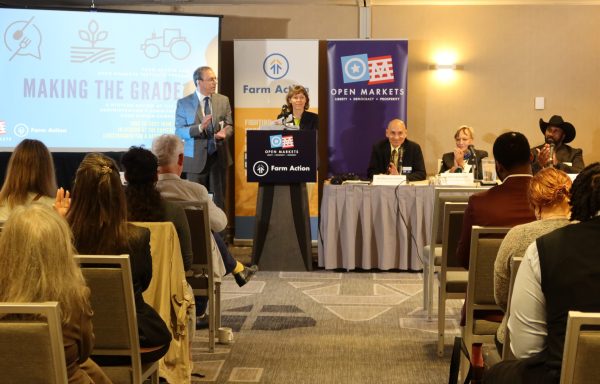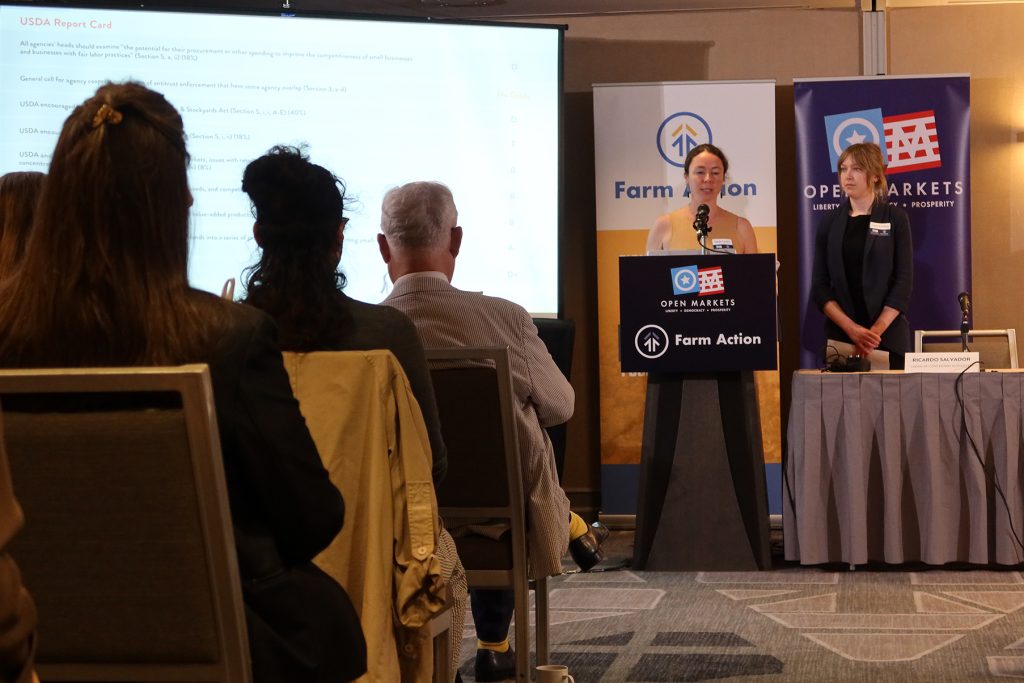Is the USDA Making the Grade?
Thanks to corporate consolidation, our food system is in crisis. Last summer’s momentous executive order to promote competition throughout the U.S. economy opened a critical window of opportunity for the Federal Trade Commission (FTC), Justice Department (DOJ), and U.S. Department of Agriculture (USDA) to stop the monopolies that harm farmers, workers, consumers, and rural America.
We don’t have a moment to lose. Almost a year has passed, so what kind of progress have these agencies made? We collaborated with the Open Markets Institute to create A Midterm Review of the Biden Administration’s Commitment to Food System Competition, a report card grading each agency’s progress toward the directives contained in the executive order.
Farmers, Ranchers, Workers, and Eaters in Action
On Tuesday, June 14th, we debuted that report card at our in-person and livestreamed event in Washington, D.C.! We filled the room with farmers, ranchers, workers, advocates, policymakers, and members of the press.
Farm Action’s vice president and co-founder, Angela Huffman, opened the event by highlighting the importance of this “once-in-decades opportunity to take action against the corporate power that’s threatening our democracy and our national security.”
Farm Action’s policy advocate Sarah Carden and Open Market Institute’s Claire Kelloway then presented the report card.

The DOJ’s B- grade reflected the fact that they’re beginning to “walk the walk” in terms of merger enforcement. To get an A, DOJ will need to follow through on their merger review process: as Sarah noted, “in the end, the opening of comment periods is not all that big of a lift.” The FTC earned high points for its renewed focus on antitrust enforcement; still, to raise their grade from a B- to an A, they’ll need to ban non-competes and exclusive dealing by dominant firms.
The lowest marks went to the USDA. As she unveiled their D+ grade, Sarah called out the slow pace and lack of progress and said that the approach to the “Product of U.S.A.” labeling rule was “the definition of beating around the bush.” Claire said that the meatpacking industry “is more consolidated today than when the Packers and Stockyards Act was passed,” and that the Act has been stripped of its ability to deliver justice for farmers.
Sarah and Claire reminded the crowd that the issues USDA has been working on are not new: 12 years ago, a similar rulemaking process went belly-up following delay after delay. Our report card and event sent a clear message that we won’t stand for a repeat performance.




Next, Farm Action communications director Dee Laninga played a video of first-person accounts from people across the country and the food supply chain, which vividly illustrated the on-the-ground impacts of food system concentration.
Attendees heard firsthand what it’s like to work in and live next to a CAFO, how consolidation forces grain farmers, cattle ranchers, and dairy farmers alike to accept below-production prices, and how the lights in the U.S. countryside are winking out, one-by-one.
In his appeal for fair markets, R-CALF USA’s president Brett Kenzy reminded viewers that “there’s a lot of work ethic and a lot of entrepreneurship out here in rural America, and if we can make a living wage, we’ll keep America fed.”
The event culminated in a panel of food and farm system experts moderated by Ricardo Salvador of the Union of Concerned Scientists. John Boyd Jr., President of the National Black Farmers Association, kicked things off with a thunderous condemnation of corporate discrimination and abuse: “They take away the choice and they take away the voice of not only Black farmers, but [of all] the American [farmers] in this country.”
Calling for swift action on stronger food labeling laws, American Grassfed Association’s Executive Director Carrie Balkcom said, “We’ve got to change the way we do business [at] the USDA: every day we delay, another farmer goes out of business.” Michael Gay, manager of Food Fresh in Claxton, Georgia and a spokesperson for the National Grocers Association, noted that the lack of competition in retail grocery is bad for consumers and store owners alike: “We are fighting for the greater good, not just for ourselves.”
And in an impassioned appeal for unity, Dennis Olson of United Food and Commercial Workers pointed to the immense political and social power demonstrated by past farm-labor alliances: “We have got to come together and not allow the divide and conquer that the other side has worked so well against us.”





Holding the USDA’s Feet to the Fire
Asked for his thoughts on our event and report card, USDA Secretary Vilsack told the Hagstrom Report that he’s looking for “guidance and direction” from Farm Action and Open Markets Institute on competition issues.
After the event, Farm Action’s staff and Local Leaders went straight to the USDA to meet with their top competition officials and provide a copy of the report card.
We will continue to hold USDA’s feet to the fire and encourage them to deliver on the directives in the executive order — which could transform our food system into one that is more fair, inclusive, and competitive.

